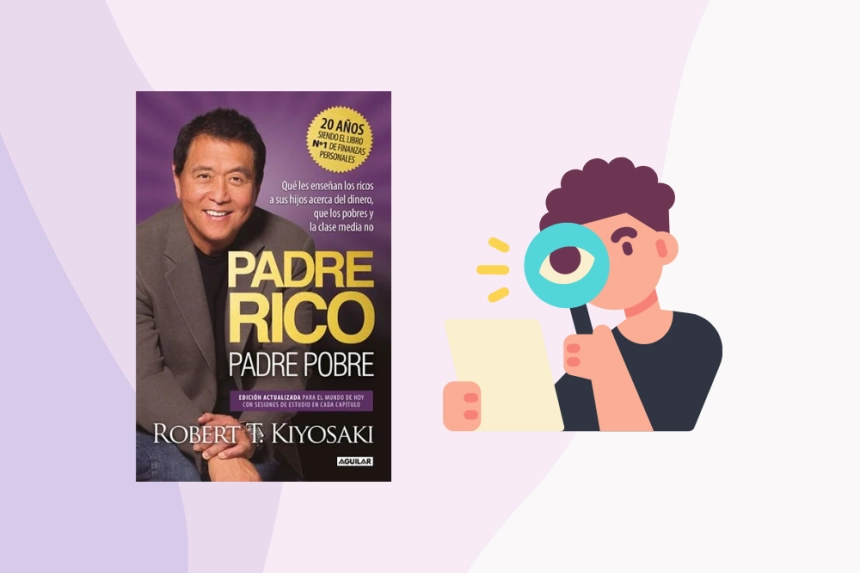Analysis of the Book Rich Dad Poor Dad by Robert Kiyosaki


"Rich Dad Poor Dad" is a book written by Robert Kiyosaki that has had a significant impact on the financial education of many people since its publication in 1997. This analysis will focus on the key concepts, lessons learned, and the influence of the book in the realm of personal finance.
Who is Robert Kiyosaki?
Robert Kiyosaki is an American entrepreneur, investor, and author known for his unconventional approach to money and investing. His personal and professional experiences have formed the foundation of his teachings and the content of "Rich Dad Poor Dad." Over the years, Kiyosaki has given lectures and workshops on financial education and has written several books in this field.
Summary of the Book
The Duality of the Fathers
One of the most interesting concepts in the book is Kiyosaki's duality of fathers. He contrasts the teachings of his "rich dad," a successful entrepreneur and self-employed individual, with those of his "poor dad," his biological father, a teacher and government employee. This duality serves as a metaphor to illustrate different approaches to money:
- Rich Dad: Promotes financial education, investment, and asset creation.
- Poor Dad: Focuses on job security, traditional education, and debt reduction.
Key Concepts
Assets and Liabilities
One of the fundamental principles Kiyosaki presents is the distinction between assets and liabilities. According to him, assets are things that put money in your pocket, while liabilities are those that take money out of it. Financial education consists of learning to accumulate assets and minimize liabilities.
The Importance of Financial Education
Kiyosaki emphasizes the need for proper financial education, which goes beyond the conventional education system. Through his experience, he asserts that understanding how money, investing, and entrepreneurship work is essential to achieving financial freedom.
Working for Money vs. Making Money Work for You
The book also addresses the idea that many people work for money, which keeps them trapped in a cycle of employment. Kiyosaki encourages his readers to shift their mindset and make money work for them by investing in assets such as real estate, stocks, and other businesses.
Lessons Learned
The Wealth Mindset
One of the most powerful lessons from "Rich Dad Poor Dad" is the importance of developing a wealth mindset. This involves:
- Taking calculated risks: Investing always carries risks, but learning to manage them is key.
- Learning from failures: Kiyosaki shares his own experiences and failures, highlighting that every mistake is a learning opportunity.
The Value of Practical Experience
Kiyosaki emphasizes that formal education is not always enough. Instead, fostering practical experience through investing and starting businesses is vital for true financial understanding.
Criticisms and Controversies
Despite its popularity, "Rich Dad Poor Dad" has faced criticisms. Some detractors argue that his advice is too simplistic or does not provide a realistic practical approach for those looking to improve their finances. Others point out that Kiyosaki's personal story and results do not always support his principles.
Responses to the Criticisms
Robert Kiyosaki has responded to the criticisms by asserting that his goal is not to be a financial guru but to motivate people to think differently about money. In fact, many of his followers appreciate his unconventional approach and his ability to demystify complex financial concepts.
Conclusion
"Rich Dad Poor Dad" has left an indelible mark on modern financial education. Its unique approach to money, investing, and wealth creation has helped thousands of people rethink their financial strategies. Although not without criticism, Kiyosaki's message about the need for financial education and the power of mindset remains relevant.
Is it Worth Reading "Rich Dad Poor Dad"?
Yes, especially if you are looking for a shift in your approach to personal finance. I encourage you to delve into its teachings and reflect on your own relationship with money. Ultimately, the key to improving your financial situation lies in education, practice, and, most importantly, the mindset you adopt.
Additional Resources
- Books by Robert Kiyosaki: Explore other books written by Kiyosaki that complement "Rich Dad Poor Dad."
- Courses and Seminars: Look for online courses or seminars on financial education that expand on the concepts discussed in the book.
- Online Communities: Join forums and discussion groups where you can share and learn about personal finance and investing.
With the right information and tools, you can take control of your finances and embark on the path to financial freedom.







